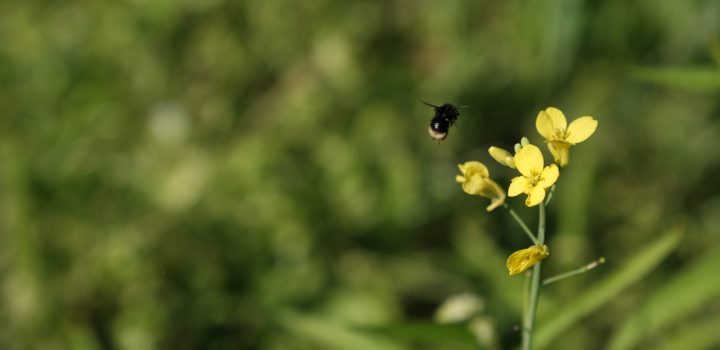Does the world’s most widely used pesticide fuel global pollinator decline?
Blog post by Benjamin Fuchs about his research funded by the Sakari Alhopuro Foundation:
Pollination decline is among the gravest global threats challenging crop production and biodiversity. Ecosystem services provided by pollinators are of vital importance to both wild plant communities and agricultural productivity. Our study group is currently investigating the connection the world’s most widely used pesticide, glyphosate, may have to pollinator decline.
Both the abundance and diversity of insect pollinators have alarmingly declined in Europe and Northern America, as well as in other parts of the world during the last decades. This applies to both the wild insect populations and domesticated species, such as bumblebees (Bombus sp.) and honeybees (Apis melifera), which provide pollination services in horticulture, agriculture and wild plant communities. The land cover, configuration, management, and pesticide use worldwide are indisputably the most important culprits responsible for pollinator decline. The economic consequences are significant as the global production of pollinator-dependent crops is valued annually at over €150 billion. Consequences are not limited to agro-ecosystems because a vast majority of plant species are animal pollinated, and all life on Earth relies on photosynthesizing plants.
Since the launch of the first glyphosate resistant crop, “Roundup Ready” soybean, in the market in 1996, the farming of genetically engineered crops resistant to herbicides has massively increased. This has led to greater use of Roundup and other glyphosate-based herbicides (GBHs). Since the expiry of the glyphosate patent in 2000, GBHs have become the most used pesticides, and glyphosate residues are found in diverse habitats across the globe. The project examines how GBHs and its environmental pollution affect pollinator behavior, learning and memory and associated cognitive mechanisms, which may be linked to their intestine microbiome.
Pesticide caused learning disability to bumblebees
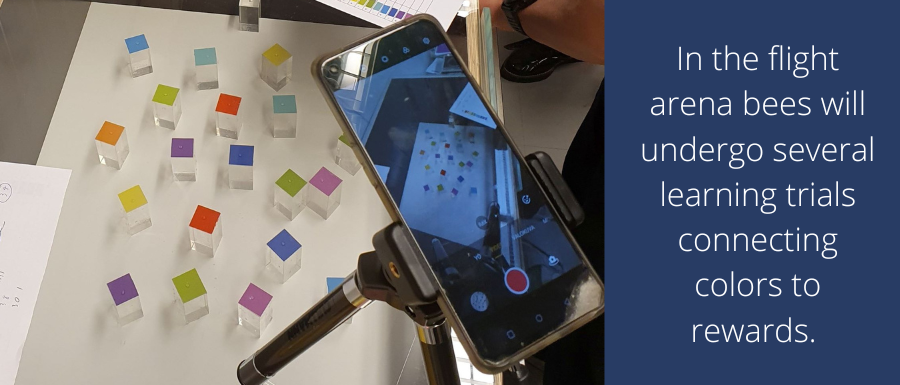
We will use bumblebee colonies to answer most of our study questions and utilize a color discrimination task to unravel effects of GBHs on color learning and memory performances on bee individuals. Individual bees are exposed individually either to a pesticide solution or to control treatment. In a flight arena bees will undergo several learning trials, where they will be allowed to choose artificial flowers, or chips with different colors, containing a rewarding sucrose solution in five colors and chips containing aversive bitter solution in five colors.
With the trial arrangement, it will be obvious to see differences in the color discrimination and color learning of bumblebees when previously exposed to GBHs. A recent pilot study led by Doc Marjo Helander from the Biology Department at UTU was conducted in collaboration with behavioral ecologist Dr. Olli Loukola (University of Oulu). The results show that the exposure to very low field-realistic concentrations of GBH (Roundup Gold) caused learning disability and memory problems in bumblebees.
Glyphosate changes the gut microbiome of bees
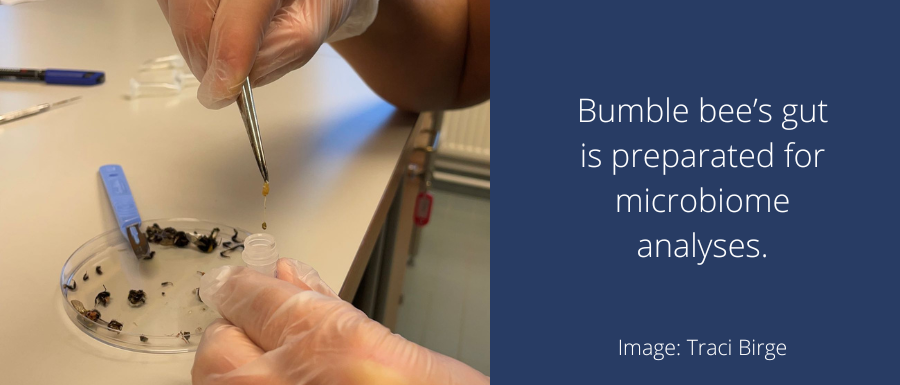
Gut microbiota may influence the brain functions and behavior of animals. The role of a bidirectional link between enteric microbiota and the brain, the so-called gut–brain axis, is less studied in insects compared to vertebrates. Glyphosate has been shown to affect the microbiota of honeybees by reducing the abundance of beneficial bacterial species that contribute to immune regulation and resistance. This disruption of the normal microbiota leads to increased mortality.
Increasing evidence demonstrates that GBHs modulate the diversity and community composition of microbiomes and that gut microbiota play a significant role in the health of their animal hosts. To fully understand how glyphosate may affect animals, we need better knowledge of how glyphosate modulates microbiomes, such as gut microbiomes that are essential to animal wellbeing.
After testing bumblebees for their cognitive learning behavior in flight arenas, we will analyze their gut microbial composition. DNA will be extracted and in collaboration with Doc Manu Tamminen from UTU we will estimate the total bacterial abundance in the gut samples, as well as the abundance of the core bacteria.
Pesticides affect flower odors
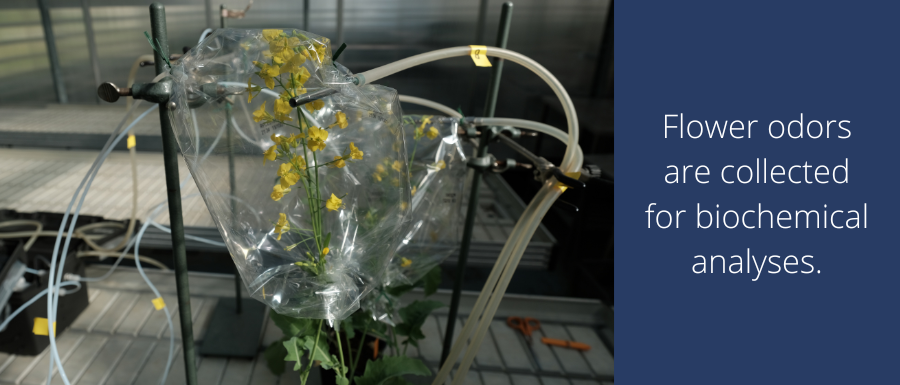
Our study group investigates the bumblebees’ ability to discriminate between GBH-treated (field realistic spray) plants and control plants. For this purpose, we set up replicated experiments in Ruissalo Botanical Garden (UTU) research greenhouses as well as common garden studies. On established field sites we will record the flower visitation on differently treated plants. Controlled greenhouse studies will also provide mechanistic understanding of bumblebee attraction to flower odors when plants are sprayed with glyphosate-based herbicides.
Simultaneously, we will analyze plant odors for their chemical composition in collaboration with Prof. James Blande from the University of Eastern Finland to pinpoint biochemical processes responsible for potential changes in bumblebee behavior. The choice test in the field will represent a real-world scenario of glyphosate spraying effects on bumblebee flower choice in the field.
Besides a direct spray effect, GBHs are accumulating in soil worldwide where they cause indirect effects on beneficial insects and pollinators via changes in plant biochemistry. Low concentrations of herbicides in soil may alter flower odors and its attraction to flower-visiting insects. On a large scale of agricultural fields the attraction of flowers to pollinators may be diminished. Together with decreasing the cognitive ability affecting memory and color discrimination of pollinators, herbicides may attribute a major role in pollinator decline and ecosystem functioning.
Our study endeavors to gain an overall picture of the changes in the metabolism of plants, reactions of pollinators to flower odors and the gut microbiome of the pollinators, and this way, to gain additional information on the background mechanisms. Our study results will be of interest to academia but they will also be beneficial when making policy decisions regarding pesticide use in agriculture, forestry, horticulture, recreational areas, and home gardens.
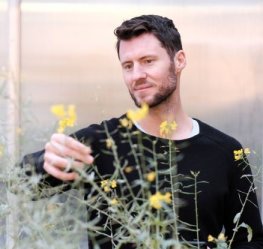
Docent PhD Benjamin Fuchs is working on chemical ecology in agricultural ecosystems studying the drivers for global anthropogenic biodiversity loss with a focus on ecosystem services provided by pollinators and other beneficial insects. He joined the Biodiversity Unit at the University of Turku in 2019 where he established a multidisciplinary network of chemists, microbiologists, plant physiologists and ecologists to tackle challenges of climate change and agrochemical pollution on plant ecology and insect biodiversity by applying holistic research approaches.
Literature:
Fuchs, B., Saikkonen, K., & Helander, M. (2021). Glyphosate-modulated biosynthesis driving plant defense and species interactions. Trends in Plant Science, 26(4), 312–323.
Helander, M., Lehtonen, T. K., Saikkonen, K., Despains, L., Nyckees, D., Antinoja, A., Solvi, C., & Loukola, O. J. (2023). Field-realistic acute exposure to glyphosate-based herbicide impairs fine-color discrimination in bumblebees. Science of the Total Environment, 857, 159298.
Leino, L., Tall, T., Helander, M., Saloniemi, I., Saikkonen, K., Ruuskanen, S., & Puigbò, P. (2021). Classification of the glyphosate target enzyme (5-enolpyruvylshikimate-3-phosphate synthase) for assessing sensitivity of organisms to the herbicide. Journal of Hazardous Materials, 408, 124556.
Ruuskanen, S., Fuchs, B., Nissinen, R., Puigbò, P., Rainio, M., Saikkonen, K., & Helander, M. (2023). Ecosystem consequences of herbicides: The role of microbiome. Trends in Ecology & Evolution, online first.
Links:
New article on glyphosate-based herbicide effects on bumblebees garners international attention
